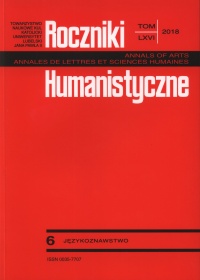Language mechanisms of apotheosis of the struggle for independence in the memories of the World War I participants (in the context of collective memory)
Abstract
The aim of the undertaken analysis is to identify linguistic ways of the glorifying approach to the struggle for independence and a try to determine the role of such descriptions in the society of the Second Polish Republic. The material for analyzes is the volume titled Służba Ojczyźnie. Wspomnienia uczestniczek walk o niepodległość [Serving the Homeland: Memories of 1915-1918 Independence Struggle Participants] (1929) which is a valuable source of research that has not been used so far for research on independence discourse. Memories respond to the official need of remembering and experiencing a moment valid for the national community, and they also realize a social expectation of the imagined role of women in an extreme situation of the statehood threat. Hence the specificity of the description of past events, in which one must see the active organization of the discursive space. One of the expressive mechanisms of this activity is the apotheosis of independence actions. The observations made allow to state that the most visible and most frequently occurring mechanisms of the apotheosis of pro-independence actions in the memories of the participants of World War I are: 1) an idealized image of female soldiers characterized by determination in action and ideological maximalism, 2) exaltation of the description manifested in the accumulation of names of feelings, especially positive ones, and stressing the intensity of emotions, 3) finally the atmosphere of sublimity, which at the level of language is revealed in the presence of the highest values. These mechanisms are strengthened by the presence of various graphic elements and stylistic means.
References
Assmann A.: Między pamięcią a historią. Antologia, Warszawa: Wydawnictwa Uniwersytetu Warszawskiego 2013.
Assmann J.: Pamięć kulturowa. Pismo, zapamiętywanie i polityczna tożsamość w cywilizacji starożytności, Warszawa: Wydawnictwa Uniwersytetu Warszawskiego 2008.
Chojnowski A.: Kobiety i polityka w Drugiej Rzeczypospolitej. Słowo wstępne, w: Kobieta i świat polityki w niepodległej Polsce 1918-1939. Zbiór studiów, t. III/2, red. A. Żarnowska, A. Szwarc, Warszawa: Wydawnictwo Sejmowe 1994.
Działaczki społeczne, feministki, obywatelki... Samoorganizowanie się kobiet na ziemiach polskich do 1918 r. (na tle porównawczym), red. Janiak-Jasińska A., Sierakowska, A. Szwarc, Warszawa: Wydawnictwo NERITON 2008.
Grzebalska W.: Płeć powstania warszawskiego, Warszawa: Instytut Badań Literackich PAN 2014.
Kula M.: Nośniki pamięci historycznej, Warszawa: DiG 2002.
Kusiak-Brownstein A.: Płeć kulturowa, „doświadczenie” i wojna – kilka metodologicznych uwag o wykorzystaniu relacji wspomnieniowych, w: Kobieta i rewolucja obyczajowa. Społeczno-kulturalne aspekty seksualności. Wiek XIX i XX. Zbiór studiów, t. IX, red. A. Żarnowska, A. Szwarc, Warszawa: DiG 2005, s. 409-420.
Le Goff J., Historia i pamięć, Warszawa: Wydawnictwa Uniwersytetu Warszawskiego 2007.
Nałęcz T.: Kobiety w walce o niepodległość w czasie pierwszej wojny światowej, w: Kobieta i świat polityki. Polska na tle porównawczym w XIX i w początkach XX wieku. Zbiór studiów, red. A. Żarnowska, A. Szwarc, Warszawa: Wydawnictwo Sejmowe 1994, s. 73-79.
Niepodległa, https://niepodlegla.gov.pl/logo/.
Szacka B.: Czas przeszły, pamięć, mit, Warszawa: Wydawnictwo Naukowe Scholar 2006.
Wielki słownik języka polskiego, online: http://www.wsjp.pl/.
Wójcicka M.: Pamięć zbiorowa a tekst ustny, Lublin: Wydawnictwo Uniwersytetu Marii Curie-Skłodowskiej 2014.
Żarnowska A., Szwarc A., Równe prawa i nierówne szanse. Kobiety w Polsce międzywojennej. Zbiór studiów, Warszawa: DiG 2000.
Copyright (c) 2018 Roczniki Humanistyczne

This work is licensed under a Creative Commons Attribution-NonCommercial-NoDerivatives 4.0 International License.





